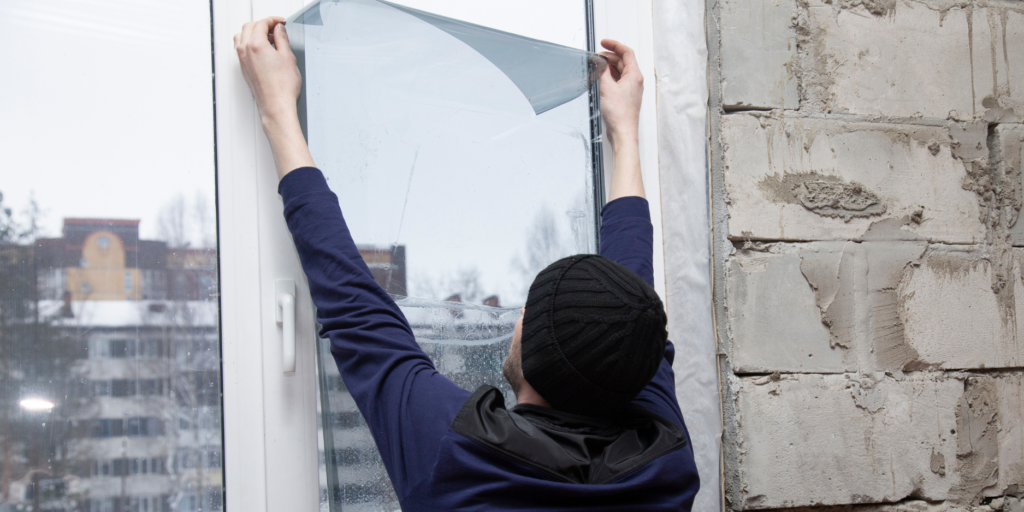
Window film has long been a go-to for homeowners looking to increase privacy, reduce glare or improve energy efficiency, but there are still plenty of myths surrounding it. From worries about damaging glass to concerns about your window warranties or making rooms feel too dark, we’re here to shed light on the truth behind some of the biggest myths around window films.
Whether you’re curious about reflective window film, wondering how to use window film or just want to know if it’s right for you and your home, here’s everything you need to know about window film.
1. Window film will damage my windows
Let’s start with one of the biggest fears: will applying window film damage your windows? The short answer is no, not if it’s installed properly.
Damage is often caused by choosing the wrong type of film for the wrong type of glass, or by not installing it correctly. We always recommend checking the type of glass you have and following installation instructions carefully – we also offer expert advice to help you choose the right window film or answer any questions you might have.
2. Window film will void my window warranty
Another myth is that applying window film will automatically void your window warranty. Again, this isn’t necessarily true.
In many cases, applying window film to glass won’t affect your warranty as long as the product is compatible with your windows. The key is to check the terms and conditions of your warranty, to make sure you’re using film that’s recommended for your specific glass type and identify whether you’re using it correctly. If in doubt, speak to the manufacturer or consult with one of our experts.
How do you remove film from windows?
Worried about what happens when it’s time to take it off? When removed carefully, window film should be easy to peel away and leave little to no residue on your windows. If there are any marks left behind, a bit of soapy water and a clean cloth is usually all it takes to wipe the surface clean. It’s a simple process that won’t damage your glass. Find out more about how to remove window film, in our video tutorial.
3. Window film will make the room too dark
A common concern is that window film will block out too much light and make your home feel gloomy. This might be true if you use blackout window film, which is specifically designed to block out all light, but there are many types of film that let in plenty of natural daylight.
Modern films come in a range of transparencies and tints, allowing you to balance privacy, glare reduction and brightness. If you’re looking for complete darkness, for a bedroom, home cinema or nursery, our blackout window film is perfect. But for most rooms, a lighter privacy or solar control film will do the job without sacrificing natural light.
4. Window film can’t protect against UV rays
It’s easy to assume that only heavy-duty materials can block harmful ultraviolet (UV) rays, but the truth is that many window films are specifically designed to filter them out.
Our UV window film helps to reduce sun damage to your furniture, flooring and fabrics, while also protecting your skin from prolonged UV exposure. In fact, our films can block up to 99% of UV rays, making them a great addition to any sun-facing room.
5. Window film cannot increase privacy in your home
Think window film can’t give you more privacy? Think again. Privacy window film is one of the most popular types of window film we offer. It’s great for street-facing windows, bathrooms or offices where you want to stop people looking in without blocking your view out.
Films come in frosted, mirrored, and patterned finishes, giving you a stylish way to keep your space private that suits your home.
6. Window film cannot reduce heat in your home
Another myth is that window film doesn’t do much to keep your home cool. This couldn’t be further from the truth. Our reflective window film is designed to reflect heat away from your windows, reducing solar gain and helping you maintain a comfortable indoor temperature. It’s especially useful for conservatories, south-facing windows or rooms that tend to overheat in summer.
And the best part? You’ll probably use fans or air conditioning less often, helping you reduce your energy consumption.
7. Window film cannot help you reduce your energy bills
When used correctly, window film can help regulate indoor temperatures, keeping the heat out in summer and retaining warmth in winter. This can lead to a noticeable difference in how hard your heating and cooling systems need to work.
By improving your home’s insulation and reducing reliance on artificial climate control, window film could help lower your monthly energy bills over time. It’s a cost-effective, low-maintenance solution for energy-conscious households.
Where can I buy window film?
We offer a wide range of window films for privacy, UV protection, solar control and decorative purposes. Whether you’re shopping for a specific need or just exploring options, our user-friendly filters make it easy to find the perfect fit for your space.